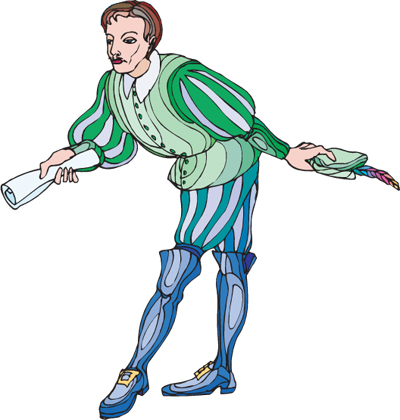
 "Neither a borrower nor a lender be," is not from The
Merchant of Venice, but it could have been. Antonio, the
merchant, lends money to his friend Bassanio, to go to the
town of Belmont and win the hand of the lovely Portia.
Antonio doesn't have the money, but he has ships coming
in and will have money soon. He borrows from Shylock, a
Jew. Only Jewish people can lend money with interest. To
be a Usurer is against Christian doctrine. Shylock says he
will not charge Antonio interest - but if he is late with
payment he will have to pay with a pound of his flesh. No
problem, Antonio's ships are due any day. Bassanio sails to
Belmont and wins the hand of Portia. Then word comes
that Antonio's ships have sunk and that Shylock is
demanding the pound of Antonio's flesh. Bassanio rushes
back to Venice to plead in court for Antonio, but to no
avail. Shylock is bitter and unrelenting. His only daughter
has stolen his money and run off with another friend of
Antonio's. Shylock states that Antonio has mocked him
cruelly in the past. Portia, disguised as a man, a lawyer,
enters court to plead Antonio's case. She entreats Shylock to be merciful with familiar words - "The
quality of mercy is not strained. It
droppeth as the gentle rain from
heaven, upon the place beneath, it is
twice blest; it blesseth him that gives
and him that takes." Shylock refuses to be merciful. Portia
proclaims Shylock the winner. He can take the pound of
flesh. Antonio agrees. As Shylock is about to cut the flesh
from Antonio - Portia reminds Shylock that he was not
promised a single drop of blood. If Antonia does bleed,
Shylock will have to forfeit his own life. Case over.
"Merchant" is one of the most debated of Shakespeare's
plays. Was Shakespeare anti-Semitic? It is doubtful he had
ever seen a Jewish person. Jews were expelled from England
in 1290 and were not re-admitted until 1655, 39 years after
his death. If he was prejudiced, why did he have Shylock
speak eloquently about the commonalities of human
experience? "If you prick us, do we not bleed? If you
tickle us, do we not laugh? If you poison us, do we not
die?" If we go to Shakespeare, do we not enjoy? We do!
"Neither a borrower nor a lender be," is not from The
Merchant of Venice, but it could have been. Antonio, the
merchant, lends money to his friend Bassanio, to go to the
town of Belmont and win the hand of the lovely Portia.
Antonio doesn't have the money, but he has ships coming
in and will have money soon. He borrows from Shylock, a
Jew. Only Jewish people can lend money with interest. To
be a Usurer is against Christian doctrine. Shylock says he
will not charge Antonio interest - but if he is late with
payment he will have to pay with a pound of his flesh. No
problem, Antonio's ships are due any day. Bassanio sails to
Belmont and wins the hand of Portia. Then word comes
that Antonio's ships have sunk and that Shylock is
demanding the pound of Antonio's flesh. Bassanio rushes
back to Venice to plead in court for Antonio, but to no
avail. Shylock is bitter and unrelenting. His only daughter
has stolen his money and run off with another friend of
Antonio's. Shylock states that Antonio has mocked him
cruelly in the past. Portia, disguised as a man, a lawyer,
enters court to plead Antonio's case. She entreats Shylock to be merciful with familiar words - "The
quality of mercy is not strained. It
droppeth as the gentle rain from
heaven, upon the place beneath, it is
twice blest; it blesseth him that gives
and him that takes." Shylock refuses to be merciful. Portia
proclaims Shylock the winner. He can take the pound of
flesh. Antonio agrees. As Shylock is about to cut the flesh
from Antonio - Portia reminds Shylock that he was not
promised a single drop of blood. If Antonia does bleed,
Shylock will have to forfeit his own life. Case over.
"Merchant" is one of the most debated of Shakespeare's
plays. Was Shakespeare anti-Semitic? It is doubtful he had
ever seen a Jewish person. Jews were expelled from England
in 1290 and were not re-admitted until 1655, 39 years after
his death. If he was prejudiced, why did he have Shylock
speak eloquently about the commonalities of human
experience? "If you prick us, do we not bleed? If you
tickle us, do we not laugh? If you poison us, do we not
die?" If we go to Shakespeare, do we not enjoy? We do!